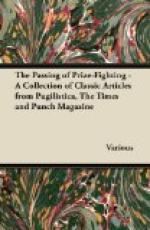[Illustration: SURGERE IN ARMIS.]
* * * * *
PUNCH’S THEATRE.
MISS ADELAIDE KEMBLE.
Let every amateur, professor, and enthusiastic raver concerning “native talent” go down on his knees, and, after the manner of the ancient heathen, return thanksgiving unto Apollo for having at last sent us a singer who knows her business! One who can sing as if she had a soul; who can act as if she were not acting, but existing amidst reality; who is, in short, a performer entirely new to the British stage; to whom we have not a parallel example to produce,—a heroine of the lyric drama.
Such, in the most exalted sense of the term, is Miss Adelaide Kemble. Unlike nearly every other English singer, she has not set up with the small stock-in-trade of a good voice, and learned singing on the stage; making the public pay for her tuition. On the contrary, nature has manifestly not been bountiful to her in this respect. Her voice—the mere organ—may have been in her earlier years exceeded in quality by many other vocalists. But what is it now? Perfect in intonation; its lower tones forcible; the middle voice firm and full; the upper interval sweet and rich beyond comparison.
But how comes this? How has this moderately-good organ been brought to such perfection? By a process not very prevalent amongst English singers—practice the most constant, study the most unwearied. Punch will bet a wager with any sporting dilettante that Miss Kemble has sung more while learning her art, than many old stagers while professing and practising it.
She seems, then,—as far as one may judge of that kind of perfection—a perfect mistress of her voice; she can do what she likes with it, she can sustain a note in any part of the soprano compass—swell, diminish, and keep it exactly to the same pitch for an incredible space of time. She can burst forth a torrent of sound expressive of our strongest passions, without losing an atom of tone, and she can diminish it to a whisper, in sotto voce, as distinct as it is thrilling and true intonation.
Having obtained this vocal mastery, she has unfettered energies to devote to her acting; which, in Norma, has all the elements of tragic dignity—all the tenderness of natural feeling. In one word, Miss Kemble is a mistress of every branch of her art; and we can now say, what we have so seldom had an opportunity to boast of, that our English stage possesses a singer who is also an actress and musician!
The opera is excellently put upon the stage. Miss Kemble, or somebody else, electrified the choruses; for, wonderful to relate, they condescended to act—to perform—to pretend to be what they are meant for! Never was so efficient, so well-disciplined, so unanimous a chorus heard or seen before on the English stage. The chorus-master deserves everybody’s, and has our own, especial commendations.




